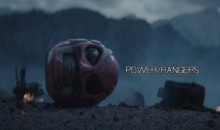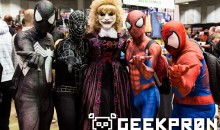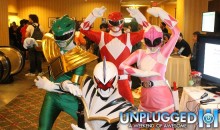I’ve Got Such a Headache: Power / Rangers Short Film Taken Down
A long time ago, during the era of the first Power Rangers team, Tommy Oliver — the Green Ranger — had been manipulated by the evil sorceress Rita Repulsa to attack his fellow Rangers. However, when he came to their side, she had a contingency plan. Rita created a candle that, when its flame went out, Tommy’s powers would be lost to her forever.
Now another flame on another magical candle also threatens to extinguish itself.
Adi Shankar and Joseph Kahn produced and directed, respectively, a fan-made fourteen minute film on the Internet which, essentially, is a gritty revisionist take on the Power Rangers: set after the Rangers’ battle with the Machine Empire and what seems to have been a truce. This got the attention of both new fans, and old: with over 12 million YouTube views in two days.
Unfortunately, Haim Saban — the owner of Saban Brands and the Power Rangers franchise — forced Vimeo and YouTube to take down the video: threatening legal action.
Power Rangers itself is a fascinating phenomenon itself. It is an American adaptation and revision of the Japanese Super Sentai genre or trope: in which a team of five people through various means possess colour-coded uniforms, fight evil beings with special powers and martial arts, and gain giant machines or mecha to fight the monsters that are also increased in strength and power. It is not uncommon for young men and girls to be the heroes of these Super Sentai story arcs.
So, in a way, one can argue that Saban Brands’ Power Rangers is its own take of a much longer-running idea. One can also argue that Power Rangers is, in itself, a parody of violence, destruction, and character development. Like the Super Sentai genre itself, it’s primarily aimed for children with a downplaying of violence and consequences in order to protect what some societies consider to be basic children’s comprehension and sensibilities.
Mighty Morphin’ Power Rangers came to Fox in 1993. An entire generation of, at least North American, children watched the show with the antics of Bulk and Skull, Ernie’s Juice Bar, Rita Repulsa animated monsters made out of clay, cardboard buildings and scenery being obliterated by giant robot dinosaur Zords, and the friendships between five Power Rangers. What Shankar and Kahn did was they took the action genre of the 2000s with its revisionist elements — embodied for good or ill best by the new Transformer movies — and created their own fan film.
Joseph Kahn’s Power / Rangers is a film that not only parodies the lack of psychological consequences in the gritty violence, action, melodrama, and sleek props and over the top CGI effects (in contrast to cheap-looking costumes and the Power Rangers’ ridiculous cardboard cut-outs), but it also manages to parody the form of the gritty reboot itself while telling its own compelling story.
And, more importantly with regards to copyright, it did this for free.
Kahn and Shankar made no profit from creating this fan film. They didn’t even crowdfund its making. It all came entirely from out of pocket. It even has a disclaimer in the end credits stating that it is a non-profit work that was not meant to interfere with anything that Saban Brands or Lionsgate might be up to with regards to their own movie. Yet while both film-makers plan to challenge the removal of their film, there is one question that remains: why did Haim Saban have their video removed in the first place?
One possibility is that, with the creation of the next Power Rangers film in 2016, Saban Brands might want to maintain their franchise’s image as “child-friendly.” Power Rangers has had complaints from parents in the past about violence and if some perceived the reboot to be a part of that franchise, Saban Brands might think its reputation could be held in question.
Of course, there is always the argument that Eric Buchman presents in his article Where’s The Line Between Fan-Fic and Copyright Infringement? Ask The Power Rangers to consider. He claims that perhaps the usage of well-known actors, professional direction, and top-notch props and special effects might have made Saban Brands feel threatened: as though they were facing someone who had the technological and financial means to genuinely steal their franchise.
But if you take the technology and money away — of which both film-makers themselves provided — what does that leave us with? It leaves us with some fanfiction or a fan work that any geek with the means could have made. Certainly, on a personal note, an old friend of mine and I used to create new Power Rangers adventures and act them out through free-form roleplaying sessions during recess: and I’m sure that we are not alone. But in fan cultures that create derivative works from their favourite franchises, that even interact with them on any creative level through actual input or homages — even with disclaimers involved — where do you draw the line? And what does that say about the relationship between content creators and their fan-bases?
Power /Rangers‘ candle may have already gone out, but can Saban Brands’ really take the power away from the Power Coin in the hands of fans?









